Big Red Book
Celebrating television's This Is Your Life
Stirling MOSS OBE (1929-2020)
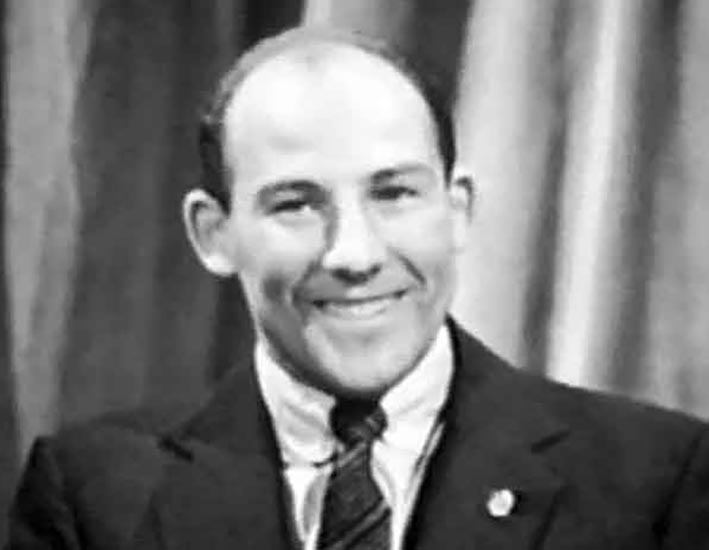
THIS IS YOUR LIFE - Stirling Moss, motor racing driver, was surprised by Eamonn Andrews outside the BBC Television Theatre.
Stirling was born in London to parents who had been amateur racing drivers. He began his career in a Cooper 500 in 1948 and had his first win in a hill climb at Stanmer Park in Brighton. The following year, on his father's suggestion, Stirling raced in a Continental season, gaining valuable experience of the bigger international venues and the exposure that brought.
His first major international race victory came on the eve of his 21st birthday at the wheel of a Jaguar XK120 in the 1950 RAC Tourist Trophy on the Dundrod Circuit in Northern Ireland. In 1955 Stirling became the first British driver to win the British Grand Prix in his first World Championship victory.
programme details...
- Edition No: 96
- Subject No: 96
- Broadcast live: Mon 27 Apr 1959
- Broadcast time: 7.30-8.00pm
- Repeated: Sun 15 Sep 1991 6.00pm
- Venue: BBC Television Theatre
- Series: 4
- Edition: 31
on the guest list...
- Peggy Shaw
- Alfred - father
- Aileen - mother
- Lance Macklin
- Tommy Wisdom
- Ken Gregory
- Alf Francis
- Katie - wife
- Don Muller Filmed tributes:
- Paul Bates
- Juan Fangio
related appearances...
- Graham Hill - Jan 1971
- Brian Johnston - Nov 1982
- Oliver Reed - Jan 1986
- Nigel Mansell - Feb 1989
- John Surtees - Dec 1992
- Maureen Rees - Sep 1997
- Murray Walker - Nov 1997
- Raymond Baxter - Feb 1998
- David Vine - Feb 2000
- Roger Cook - Apr 2003
production team...
- Researchers: Nickola Sterne, Peter Moore
- Writers: Nickola Sterne, Peter Moore
- Director: Vere Lorrimer
- Producer: T Leslie Jackson
- names above in bold indicate subjects of This Is Your Life
Stirling Moss recalls his experience of This Is Your Life in an exclusive interview recorded in November 2013
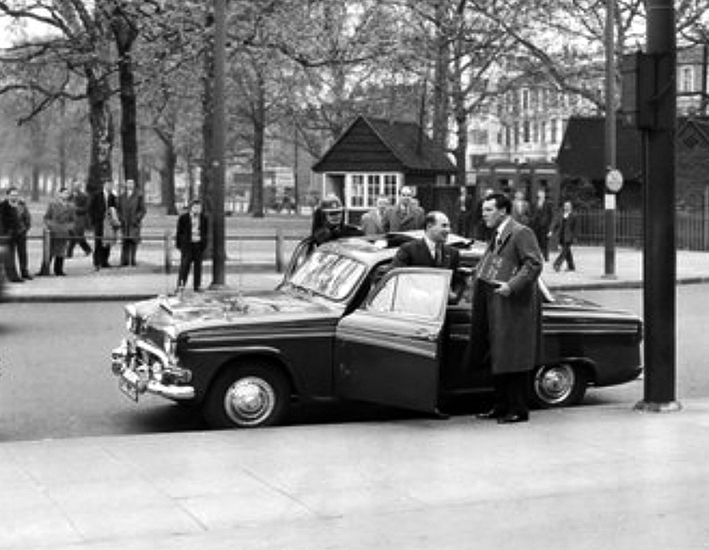
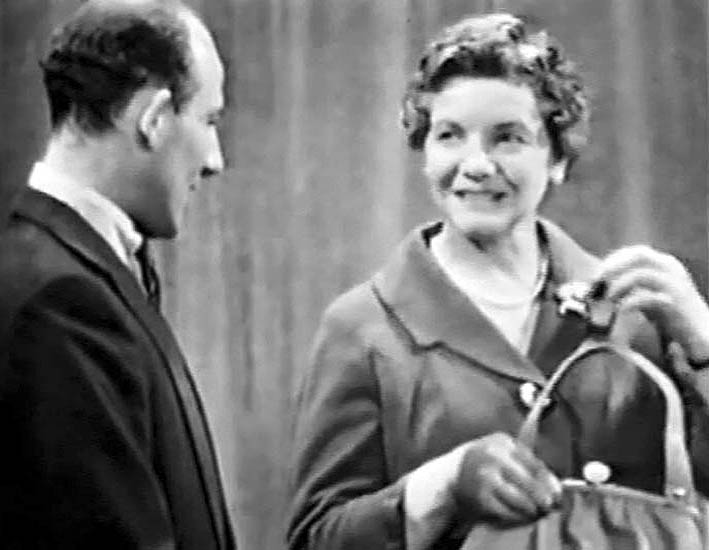
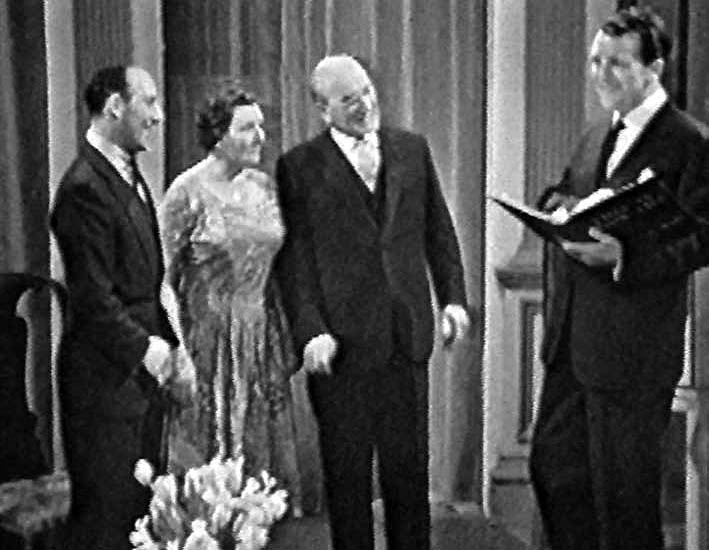
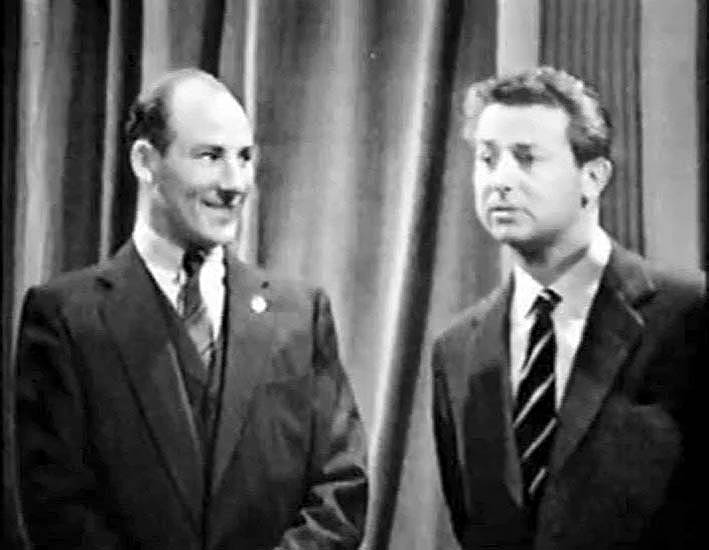
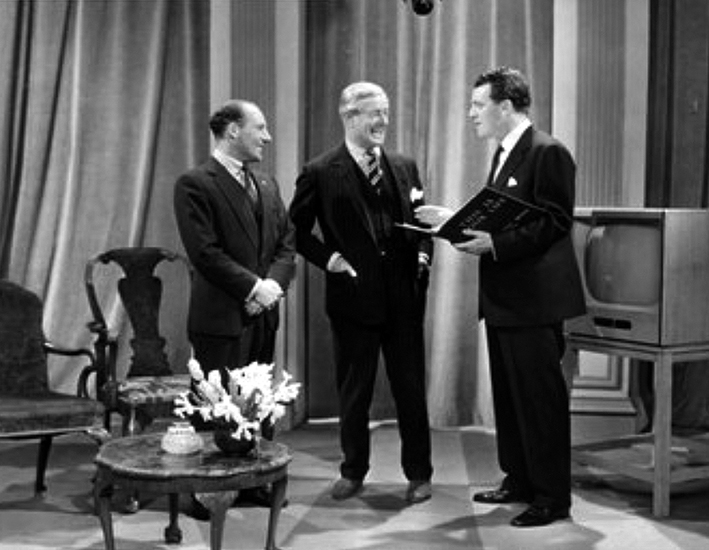
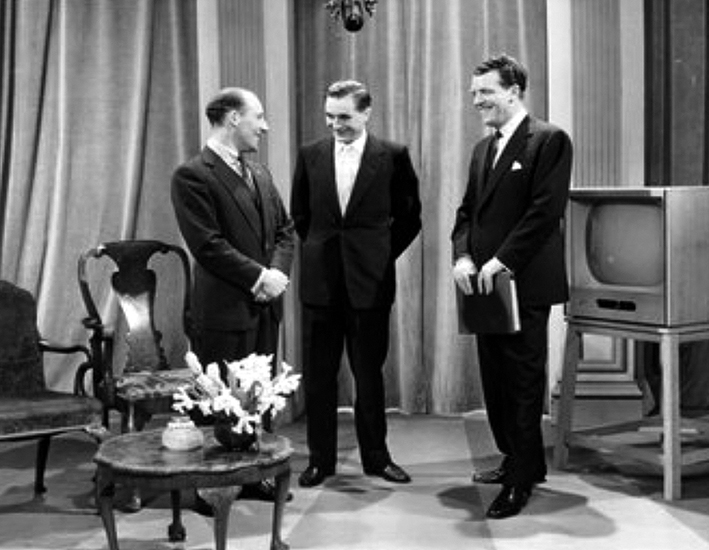
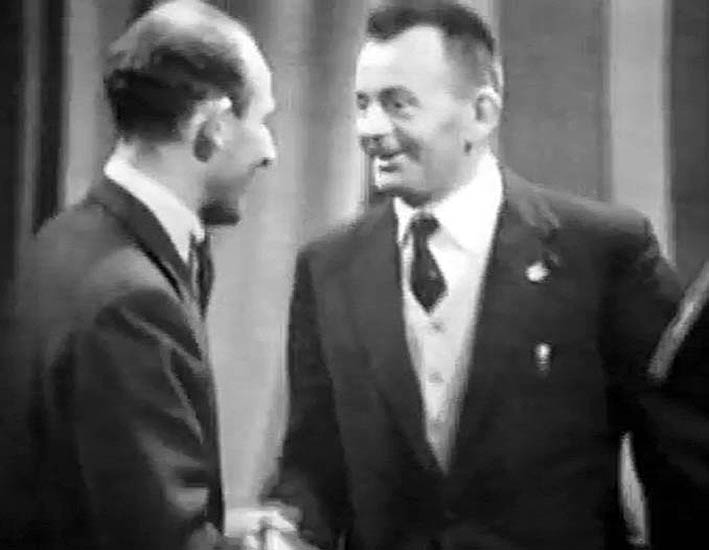
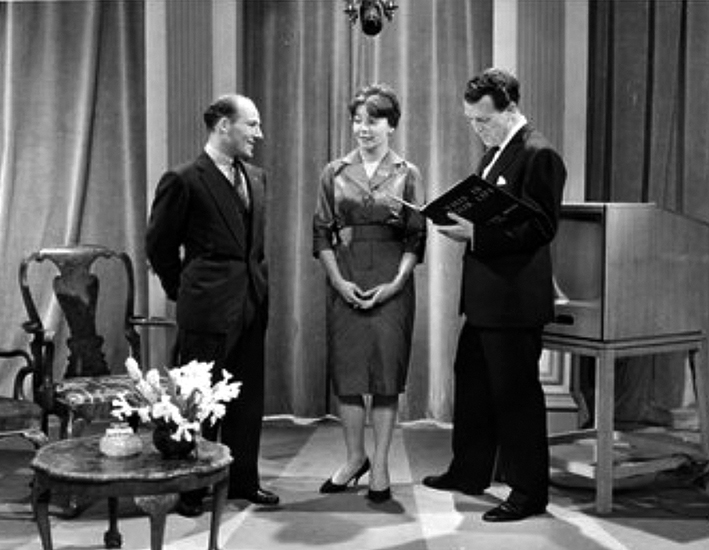
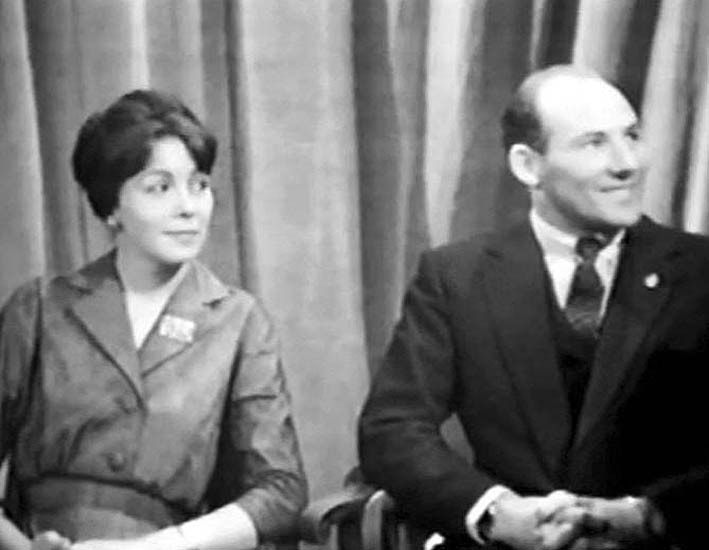
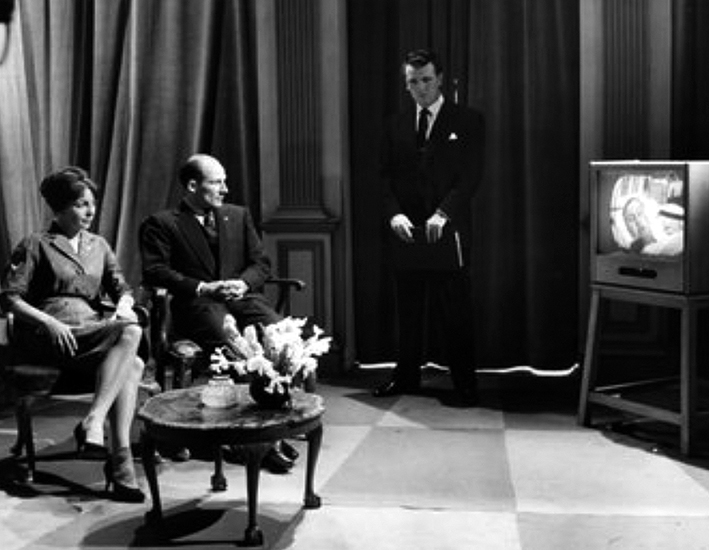
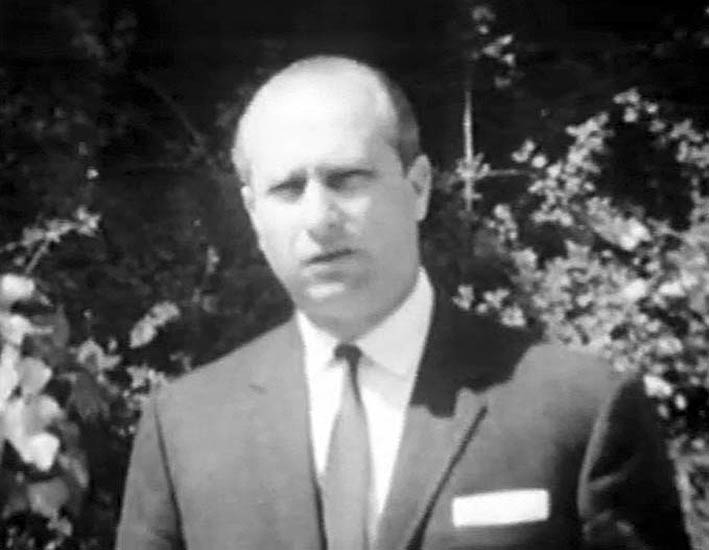
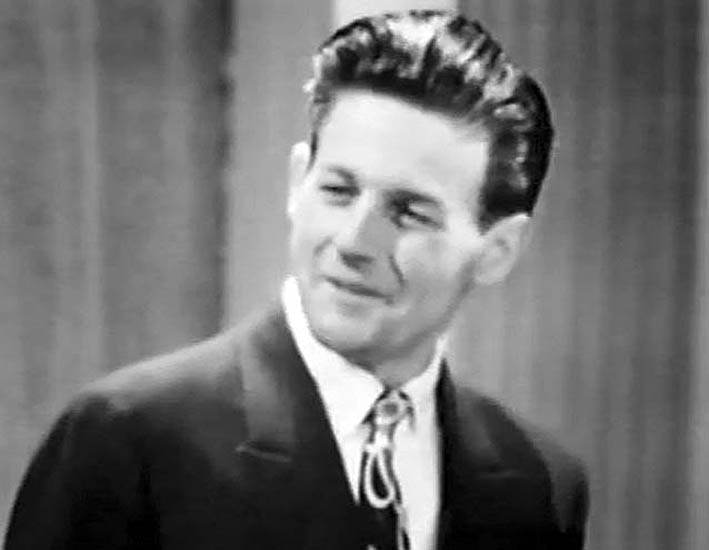
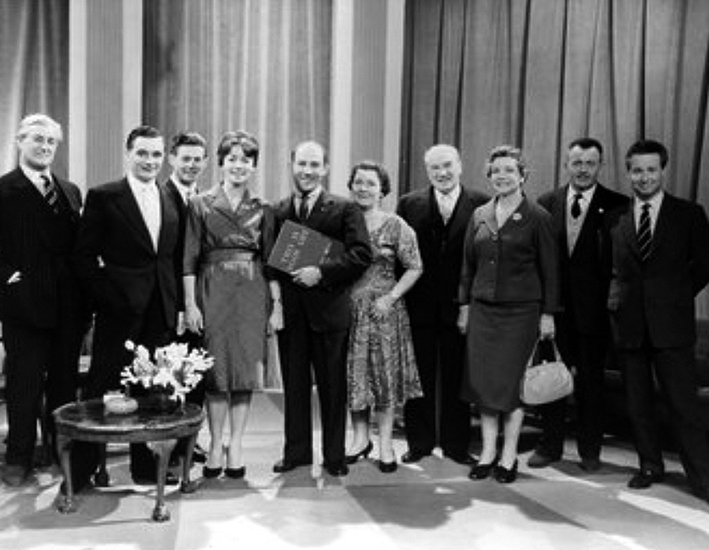
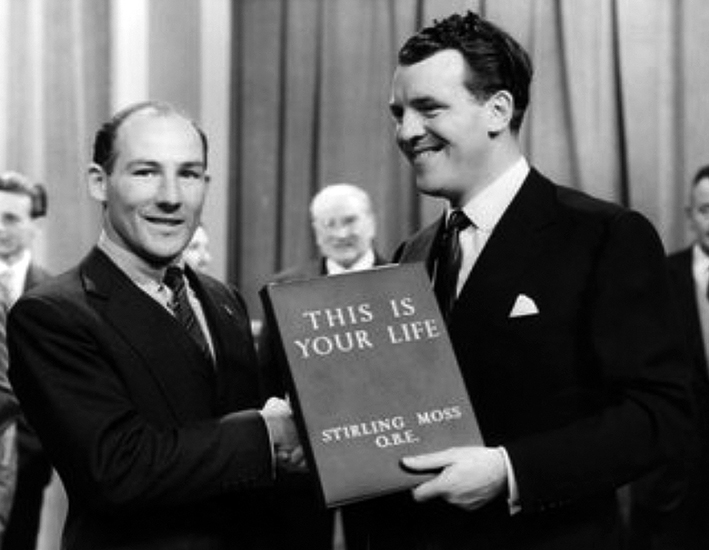
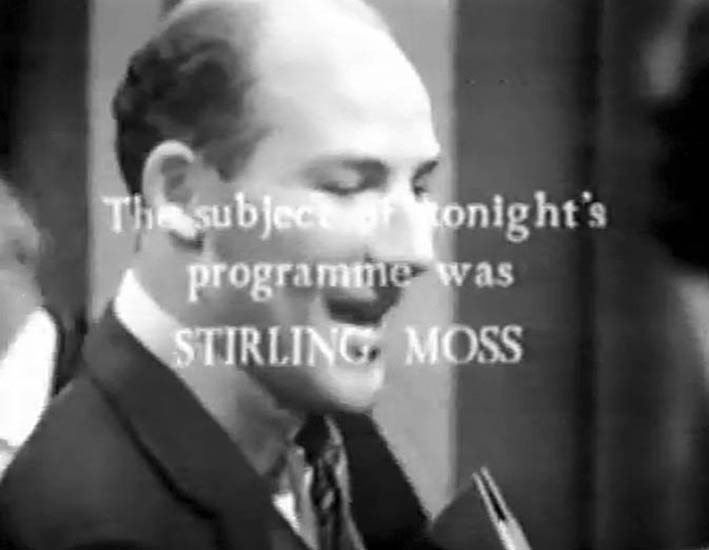
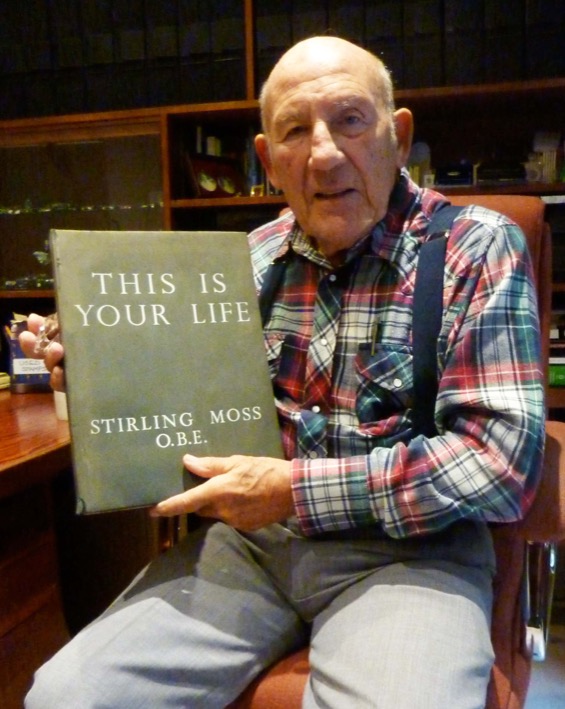
Photographs and screenshots of Stirling Moss This Is Your Life - and Stirling Moss photographed at his home in November 2013
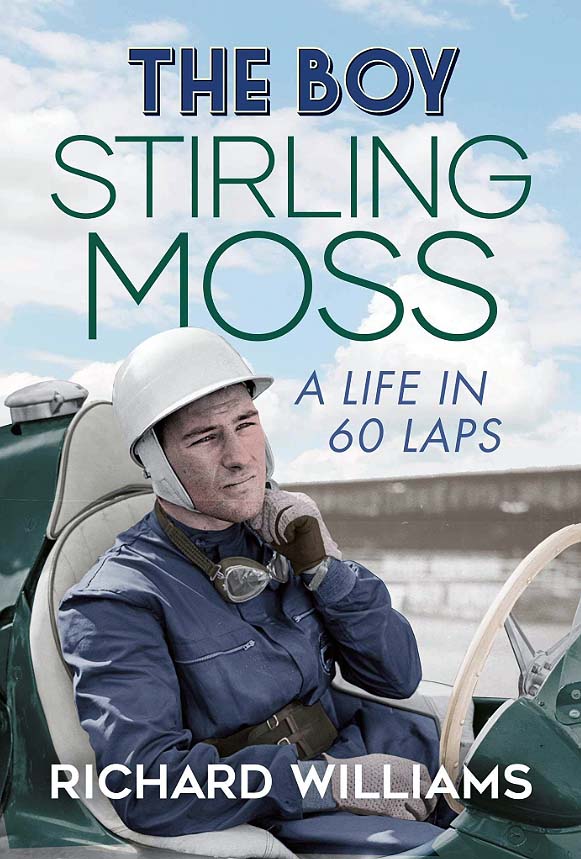
It's an evening in April 1959 and Eamonn Andrews, one of Britain's most prominent television personalities, is addressing the audience in the BBC Television Theatre. He's teasing them with clues about the identity of the subject of this week's edition of This Is Your Life - always a closely guarded secret until the moment Andrews, clutching the large red-covered book containing the biography in question, confronts the unsuspecting celebrity, who has been brought to the location of the live telecast under false pretences.
'He's a tricky character, this one - difficult to manoeuvre where we want him, when we want him - which is now,' Andrews says, addressing the audience sitting at home in front of their screens. 'So will you please come out into the street outside our theatre to see if we have manoeuvred him.' He is followed by a camera as he makes his way out of the theatre's main entrance and onto the pavement.
'We haven't got him here yet but there's a lot of traffic, a lot of people gathering in Shepherd's Bush Green... and let's hope that our man arrives... You do see the crowd gathering outside, even though we've hidden the name of the show tonight...'
A saloon car draws up, ordered into the kerb by a policeman on a motorcycle. 'Ah, this looks like trouble! Well, now, let's see - a speed cop, eh? Well, let me tell you, he's not a policeman at all - he's an actor. The people in the car don't know that, but we do.' As he speaks, a slightly built, balding man in a suit gets out of the front seat of the saloon.
'I've got a different sort of a summons,' Andrews tells him. 'Stirling Moss - there are the cameras - this is your life.'
Moss looks surprised, turns as if to get back into the car. but then turns again and accepts Andrews' greeting. Together they walk through the small crowd and into the theatre before making their way down the aisle, Moss shielding his eyes against the spotlights, until they reach the stage, where several empty chairs are arrayed around a low table on which is placed a vase of flowers, with a TV set on a stand in the background. Andrews guides him into one of the chairs while positioning himself next to the TV.
'You know,' he tells Moss, 'we'd thought of putting a microphone in the car, but we'd heard of some of the things that you're alleged to have said to speed cops, so we thought we'd take the microphone out.'
'Just as well, actually,' Moss replies.
'Anyway, Stirling Moss, virtuoso of the steering wheel, this is your life,' Andrews says, reading his script from the red-covered book. 'Now most of us only know you as a sort of robot in a racing car, remote and dedicated, come and gone in the wink of an eye. A young man in a hurry who knows where he's going - and usually gets there first. But that's today. Let's look at yesterday, or rather twenty-five years ago.' He turns to the TV set and the audience laugh as they're shown a blurry home movie of a child hurtling down a lane in a pedal car. 'Even then, a young man in a hurry,' Andrews says.
Two days before the programme, Moss had won the Syracuse Grand Prix. A photograph of a triumphant Moss comes up on the screen. 'This morning's headlines, there it was: "99 miles per hour - Stirling Moss does it again!" From boy to man, from obscurity to fame, from a bob a week pocket money to the salary of a prime minister - from start to finish, yours might be the story of one of your own racing engines: highly tuned, liable to blow up at times but the source of tremendous tireless energy.'
And now the story begins, told - as is the programme's tradition - by witnesses whose voices are heard before they make their way onto the stage. The first is a prep-school mistress, Peggy Shaw, who is there to tell us what a scamp he was. 'He had more than his share of energy and I soon realised that I had to have eyes in the back of my head. I used to say, "Whatever you're doing Moss, don't do it!"' Touchingly, she produces a present he gave her when he was aged ten: a tiny bottle of Evening in Paris perfume. 'A fast mover, even then,' Andrews remarks archly.
We see film of the young Moss getting fit by hitting a punch bag before Andrews introduces the next guests. 'You might have spent your days saying, "Open wider, please,"' he says, and a disembodied male voice responds: "And if I'd had my way, he would've." It's Alfred Moss, who comes on stage accompanied by Stirling's mother, Aileen: a pair of proud middle-aged parents. They talk about his early racing career: 'He couldn't tell his mother or I that we didn't know what we were talking about,' Alfred says, 'because we did.' Aileen adds: 'The thing to make Stirling realise was that we did that for fun. We were amateurs. It cost us a lot of money, From a mother's point of view, I'd much rather he were pulling out teeth - it's much safer.'
Andrews describes how, when Moss got his hands on a Formula 3 Cooper in 1948, his first win came in a hill climb at Stanmer Park. 'That was the day we both got our names in the papers for the first time,' says the next disembodied voice, which turns out to belong to Lance Macklin, a smoothie in a regimental tie who has arrived from Paris to talk about how they had chased women together during their days in the HWM team.
Tommy Wisdom, the Daily Herald's motoring correspondent, remembers the 1950 Dundrod TT, which Moss won in his XK120: 'I must say, Stirling, I liked your nerve, asking me if you could drive my car.' We see film of the following year's TT and hear the Spitfire-pilot voice of the BBC's Raymond Baxter: 'Two minutes ahead of anyone else, the chequered flag signalled another win for Stirling Moss, his second successive triumph in this race.' Ken Gregory, his friend and manager, comes on to speak of the disappointments of 1952 and 1953: 'Although we did our best and tried many things, at the last minute something always went wrong.' Gregory glances at Moss. 'I wish he'd learn to relax a bit.' he says. This is about the first time I haven't seen him doing anything. He's always designing a house or a car or a boat or something.'
Andrews summons the voice of an unseen Alf Francis. 'Hello, Stirling,' he says. 'I'm still catching up on the sleep I lost working for you.' Francis enters from the wings. Did he and Moss, Andrews asks, always see eye to eye? 'In the majority of cases, never! But then again whatever arguments we had. we just worked like two brothers. We could have been arguing but we were working to the same end.' He concludes: 'Since I came to work for him in 1951, I realised he was a champion. Now I think he is the greatest living.' 'Thank you, Alf,' Moss murmurs.
A piece of film from the Mercedes archive shows him with Denis Jenkinson in the 300SLR. 'Ahead of you now are the years of fulfilment,' Andrews says, 'the fulfilment for you of a special dream - to be first past the chequered flag driving not in the racing red of Italy or the silver of Germany but the dark green of Britain. At last, 1956, here it was, the Vanwall Special with you ...' - the audience applauds - '... as everyone knows, with you at the wheel, you were as good as if not better than the best. And 1957 brings with it another kind of success - marriage. After a hard day's driving - a wife to come home to, a chair to relax in.'
'Don't be silly, Eamonn. Stirling never relaxes.'
'That's the voice,' Andrews says, 'of his long-suffering wife, Katie Moss!'
And on she comes, cool and elegant, to hear Eamonn's scripted set-up: 'I believe that you're one of the greatest gin-rummy experts in Europe?'
'Well, Eamonn, if I'm not, then I should be. Because Stirling and I travel many thousands of miles each year in a plane and I usually like to sit and look out of the window or write letters, but he's always saying, "Well, come on, come on, let's play something" - gin-rummy or cribbage or something. He just never relaxes.'
'With all this travelling around, you must have watched him in a good many places...'
'Yes, I have, but he changes when he gets onto the track. He becomes a different sort of person. He often doesn't recognise me. I know the times when I've stood in the pits and he's looked right by me.'
There's a slightly forced laugh from Andrews. 'But off the track he notices you, I bet.'
'He'd better.'
There's a hint of a smile. Only she and Stirling know that, after a year and a half of marriage to her racing driver, she is feeling the strain.
Then it's on to Paul Bates, a young man who caught polio and lost the use of his legs while doing his national service in Malaya. From his wheelchair, he thanks Stirling for the help he's given him: 'At fourteen I'd seen your first race, in the crowd, of course, and later at Goodwood it was one of the last things I did before I went to Malaya, only to come back like this. Your generosity helped so much to turn my dreams into reality. Several times you've been my chauffeur - some chauffeur! Seriously, though, I know it was your wish that your generosity should remain a secret, and I hope you'll forgive me for breaking my word.'
Juan Manuel Fangio is seen on the monitor screen, in a message from Rome, remembering the time they spent together - 'often as opponents, always as friends'. But Andrews has saved the biggest surprise for last.
'There is just one more voice for you to hear, Stirling, and it's a voice that you never expected to hear again. It dates back only twelve years but it's a reminder of the long, long way that you've come in that short time. I want you to think of yourself back in 1947: a grimy kid with a second-hand sports car and not much else except ambition. Sharing with you those long hours in your father's workshop, sweating to get it right, was a former German prisoner of war, a general handyman-turned-amateur mechanic. You know who it is, don't you?' Moss smiles and nods. 'That's right. We found him in Aschau, a little village in Bavaria - your first mechanic and your first fan, Don Muller.'
Muller comes on, a shy figure. 'I told him many times,' he says, 'I knew one of those days he would become one of the greatest racing drivers of the world.'
'You said it first, Don,' Andrews says, 'but today we're right with you. Stirling Moss OBE, this is your life.'
Series 4 subjects
Jo Capka | Jimmy Edwards | Andrew Milbourne | Bella Burge | Tommy Steele | Ronald Shiner | James Edward WoodMargaret Rowena Jones | John Griffiths | Freddy Bloom | Bransby Williams | Miriam Moses | Elsie Mullock | John Vidler
Florence Desmond | Noel Duckworth | Alfred Daniel Wintle | Ted Heath | Andrew Macdonald | Harriet Cohen
Willie Hall | Reginald Blanchford | Kenneth More | Hugh Llewelyn Glyn Hughes | Miriam Jowett | Ted Willis
Alfred Southon | Tiger Sarll | Mary Ward | Roy Gill | Stirling Moss | Ethel Goldsack | Tommy Trinder